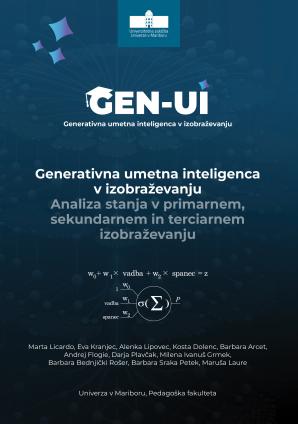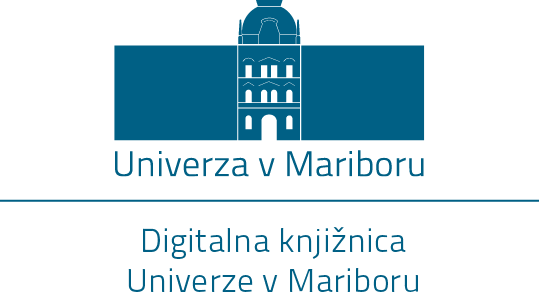Generativna umetna inteligenca v izobraževanju: Analiza stanja v primarnem, sekundarnem in terciarnem izobraževanju
Ključne besede:
izobraževanje, generativna umetna inteligenca, učitelji, učenci, vodstveni delavciKratka vsebina
Monografija predstavlja prvo celovito in sistematično analizo stanja uporabe generativne umetne inteligence (GEN-UI) v izobraževanju v Sloveniji. Raziskava, strukturirana skozi enajst tematskih področij, zajema različne deležnike vzgojno-izobraževalnega sistema na primarni, sekundarni in terciarni ravni. Vsebina ponuja poglobljen vpogled v vrste, pogostost in namene uporabe GEN-UI v osnovnih, srednjih šolah ter fakultetah. Obravnavani so izzivi, s katerimi se srečujejo deležniki pri uporabi GEN-UI, etična vprašanja ter pedagoške priložnosti, ki jih omogočajo orodja GEN-UI. Analizirane so tudi potrebe po usposabljanju, zaznane tehnične omejitve ter predlogi za optimizacijo uporabe GEN-UI v pedagoških procesih. Poseben poudarek je namenjen percepciji vpliva GEN-UI na različne vidike vzgojno-izobraževalnega dela, vključno z organizacijsko podporo, zaznanimi koristmi, uporabniško izkušnjo ter doživljanjem procesov učenja, poučevanja in vodenja ob uporabi GEN-UI. Monografija predstavlja pomemben znanstveni in strokovni doprinos k področju edukacijskih ved ter nudi dragocene usmeritve za oblikovanje strateških politik in odločitev na področju vzgoje in izobraževanja v prihodnosti.
Prenosi
Literatura
Arcet, B. (2024). Integracija umetne inteligence v poučevanje: kako učinkovito oblikovati pozive? Matematika v šoli, 30(2), 8–14.
Arcet, B. (2025). Integrating artificial intelligence in teaching: How to effectively formulate prompts. In INTED2025 Proceedings (pp. 1316–1321). IATED.
Aberšek, B. & Flogie, A. (2022). Umetna inteligenca in prihodnost učenja in poučevanja. V J. Bregant, B. Aberšek & B. Borstner (ur.), Sodobne perspektive družbe: umetna inteligenca na stičišču znanosti (str. 287–308). Univerzitetna založba Univerze v Mariboru. https://doi.org/10.18690/um.ff.11.2022.14
Adams, C., Pente, P., Lemermeyer, G. & Rockwell, G. (2023). Ethical principles for artificial intelligence in K-12 education. Computers and Education: Artificial Intelligence, 4, 100131. https://doi.org/10.1016/j.caeai.2023.100131
Ahmed, Z., Shanto, S., Rime, M., Morol, M., Fahad, N., Hossen, M., & Abdullah-Al-Jubair, M. (2024). The Generative AI Landscape in Education: Mapping the Terrain of Opportunities, Challenges, and Student Perception. IEEE Access, 12, 147023-147050. https://doi.org/10.1109/ACCESS.2024.3461874
Akgun, S. & Greenhow, C. (2022). Artificial intelligence in education: Addressing ethical challenges in K-12 settings. AI Ethics, 2, 431–440. https://doi.org/10.1007/s43681-021-00096-7
Alqahtani, T., Badreldin, H. A., Alrashed, M. idr. (2023). The emergent role of artificial intelligence, natural learning processing, and large language models in higher education and research. Research in Social and Administrative Pharmacy, 19(8), 1236–1242. https://doi.org/10.1016/j.sapharm.2023.05.016
Asad, M., & Ajaz, A. (2024). Impact of ChatGPT and generative AI on lifelong learning and upskilling learners in higher education: unveiling the challenges and opportunities globally. The International Journal of Information and Learning Technology. https://doi.org/10.1108/ijilt-06-2024-0103
Baidoo-Anu, D., & Owusu Ansah, L. (2023). Education in the era of generative artificial intelligence (AI): Understanding the potential benefits of ChatGPT in promoting teaching and learning. Journal of AI, 7(1), 52–62. https://doi.org/10.61969/jai.1337500openresearch.amsterdam+4Home+4SCIRP+4
Bhutoria, A. (2022). Personalized education and artificial intelligence in the United States, China, and India: A systematic review using a Human-In-The-Loop model. Computers and Education: Artificial Intelligence, 3, 100056.
Bond, M., Khosravi, H., de Laat, M., Bergdahl, N., Negrea, V., & Hense, J. (2024). A meta systematic review of artificial intelligence in higher education: A call for increased ethics, collaboration, and rigour. International Journal of Educational Technology in Higher Education, 21, 1. https://doi.org/10.1186/s41239-023-00436-z
Chiu, T. K. F. (2023). Teacher support and student motivation to learn with Artificial Intelligence (AI) based chatbot. Interactive Learning Environments. Advance online publication. https://doi.org/10.1080/10494820.2023.2172044selfdeterminationtheory.org+2ResearchGate+2irrodl.org+2
Chiu, T. K. F., Xia, Q., Zhou, X., Chai, C. S. & Cheng, M. (2023). Systematic literature review on opportunities, challenges, and future research recommendations of artificial intelligence in education. Computers and Education: Artificial Intelligence, 4, 100118. https://doi.org/10.1016/j.caeai.2022.100118
Crompton, H., & Burke, D. (2023). Artificial intelligence in higher education: The state of the field. International Journal of Educational Technology in Higher Education, 20, 44.
Digital Luxembourg. (2019). AI: A strategic vision for Luxembourg. Luxembourg Government. https://digital-luxembourg.public.lu/sites/default/files/2020-09/AI_EN_0.pdf
Dolenc, K. & Brumen, M. (2024). Exploring social and computer science students' perceptions of AI integration in (foreign) language instruction. Computers and Education: Artificial Intelligence, 7, 100285, 1–13. https://doi.org/10.1016/j.caeai.2024.100285
Dolenc, K. (2024). Educational transformation: Exploring the benefits of generative AI tools. V M. Licardo & A. Lipovec (ur.), Artificial intelligence literacy and social-emotional skills as transversal competencies in education (str. 59–84). Verlag Dr. Kovač. https://www.verlagdrkovac.de/open-access/978-3-339-13814-9.htm
Duhaylungsod, A. V. in Chavez, J. V. (2023). Chatgpt and other ai users: Innovative and creative utilitarian value and mindset shift. Journal of Namibian Studies: History Politics Culture, 33, 4367–4378. https://doi.org/10.59670/jns.v33i.2791
EASNIE - European Agency for Special Needs and Inclusive Education. (2022). Inclusive Digital Education – Policy Report. Pridobljeno: https://www.european-agency.org/resources/publications/inclusive-digital-education
European Commission. (2022). Ethical guidelines on the use of AI and data in teaching and learning for educators. Brussels: European Commission. Pridobljeno: https://op.europa.eu/en/publication-detail/-/publication/d81a0d54-5348-11ed-92ed-01aa75ed71a1/language-en
European Commission. (2023). Living guidelines on the responsible use of generative AI in research. European Commission Directorate-General for Research and Innovation. https://research-and-innovation.ec.europa.eu/document/2b6cf7e5-36ac-41cb-aab5-0d32050143dc_en
European Parliament. (2021). Resolution of 19 May 2021 on artificial intelligence in education, culture and the audiovisual sector. https://www.europarl.europa.eu/doceo/document/TA-9-2021-0238_EN.html
Evropski parlament in Svet Evropske unije. (2024). Regulation (EU) 2024/1689 of the European Parliament and of the Council on Artificial Intelligence (Artificial Intelligence Act). Uradni list Evropske unije. https://eur-lex.europa.eu/legal-content/SL/TXT/?uri=CELEX%3A32024R1689
Falloon, G. (2020). From digital literacy to digital competence: The teacher digital competency (TDC) framework. Educational Technology Research and Development, 1–24. https://doi.org/10.1007/s11423-020-09767-4
Feng, S., & Law, N. (2021). Mapping artificial intelligence in education research: A network‐based keyword analysis. International Journal of Artificial Intelligence in Education, 31(4), 772–799.
Flogie, A. & Aberšek, B. (2022). Artificial intelligence in education. V O. Lutsenko (ur.), Active learning – theory and practice (str. 97–117). IntechOpen. https://doi.org/10.5772/intechopen.96498
Government of Ireland. (2021). National AI Strategy. Department of Enterprise, Trade and Employment, Government of Ireland. https://enterprise.gov.ie/en/Publications/Publication-files/National-AI-Strategy.pdf
Holmes, W., Bialik, M., & Fadel, C. (2019). Artificial intelligence in education: Promises and implications for teaching & learning. Boston: Center for Curriculum Redesign.
Jauhiainen, J. S., & Garagorry Guerra, A. (2023). Generative AI and ChatGPT in school children’s education: Evidence from a school lesson. Sustainability, 15(18), 14025. https://doi.org/10.3390/su151814025
Kasneci, E., Gross, S., Buder, J., & others. (2023). The role of ChatGPT in education: A boon or a bane? Computers and Education: Artificial Intelligence, 4, 100100.
Kim, Y., Lee, M., Kim, D. in Lee, S.-J. (2023). Towards explainable ai writing assistants for non-native english speakers. arXiv preprint arXiv:2304.02625.
Kohezijski regiji v Sloveniji (2025). Kohezijski regiji v Sloveniji, pridobljeno iz: https://www.gov.si/teme/kohezijski-regiji-v-sloveniji/
Kumar, S., Rao, P., Singhania, S., Verma, S., & Kheterpal, M. (2024). Will artificial intelligence drive the advancements in higher education? A tri-phased exploration. Technological Forecasting and Social Change. https://doi.org/10.1016/j.techfore.2024.123258
Laupichler, M. C., Aster, A., Schirch, J. & Raupach, T. (2022). Artificial intelligence literacy in higher and adult education: A scoping literature review. Computers and Education: Artificial Intelligence, 3, 100101. https://doi.org/10.1016/j.caeai.2022.100101
Lipovec, A. (2024). Connecting AI and SEL: A new approach in teacher education = Povezovanje UI in SEL: nov pristop v izobraževanju učiteljev. V M. Marinšek & M. Hmelak (ur.), Interdisciplinary research in teaching and learning: [rethinking childhood]: new perspectives and approaches (str. 149–165). Univerzitetna založba Univerze v Mariboru. https://doi.org/10.18690/um.pef.2.2024.9
Lipovec, A., Arcet, B. & Ferme, J. (2024). Connecting the dots: Exploring the correlation between socio-emotional learning beliefs and attitudes toward artificial intelligence. V B. Aberšek & M. Cotič (ur.), Challenges and transformation of education for 21st century schools (str. 215–242). Cambridge Scholars Publishing.
Lipovec, A., Kaučič, B. & Arcet, B. (2024). Intersecting evaluations: Digital competence and AI attitudes among students. V M. Licardo & A. Lipovec (ur.), Artificial intelligence literacy and social-emotional skills as transversal competencies in education (str. 31–57). Verlag Dr. Kovač. https://www.verlagdrkovac.de/open-access/978-3-339-13814-9.htm
Manhiça, R., Santos, A., & Cravino, J. (2022). The use of artificial intelligence in learning management systems in the context of higher education: Systematic literature review. V 2022 17th Iberian Conference on Information Systems and Technologies (CISTI) (str. 1–6). IEEE.
McGrath, C., Cerratto Pargman, T., Juth, N. & Palmgren, P. J. (2023). University teachers' perceptions of responsibility and artificial intelligence in higher education - An experimental philosophical study. Computers and Education: Artificial Intelligence, 4, 100139. https://doi.org/10.1016/j.caeai.2023.100139
Miao, F., & Holmes, W. (2023). Guidance for generative AI in education and research. Paris: UNESCO. Pridobljeno iz: https://www.unesco.org/en/articles/guidance-generative-ai-education-and-research
Mirazchiyski, P. V. (2024). Contemporary gaps in research on digital divide in education: A literature review. Universal Access in the Information Society. https://doi.org/10.1007/s10209-024-01166-3
Mittal, U., Sai, S., Chamola, V., & Sangwan, D. (2024). A Comprehensive Review on Generative AI for Education. IEEE Access, 12, 142733-142759. https://doi.org/10.1109/ACCESS.2024.3468368
Monib, W., Qazi, A., Apong, R., Azizan, M., De Silva, L., & Yassin, H. (2024). Generative AI and future education: a review, theoretical validation, and authors’ perspective on challenges and solutions. PeerJ Computer Science, 10. https://doi.org/10.7717/peerj-cs.2105.
Ng, D., Chan, E., & Lo, C. (2025). Opportunities, Challenges and School Strategies for Integrating Generative AI in Education. Computers and Education: Artificial Intelligence. https://doi.org/10.1016/j.caeai.2025.100373
Nguyen, A., Ngo, H. N., Hong, Y. idr. (2023). Ethical principles for artificial intelligence in education. Education and Information Technologies, 28, 4221–4241. https://doi.org/10.1007/s10639-022-11316-w
Nyaaba, M., Wright, A., & Choi, G. (2024). Generative AI and Digital Neocolonialism in Global Education: Towards an Equitable Framework. ArXiv, abs/2406.02966. https://doi.org/10.48550/arXiv.2406.02966
OECD (2021). OECD Digital Education Outlook 2021: Pushing the Frontiers with AI, Blockchain and Robots. OECD Publishing. Pridobljeno iz: https://doi.org/10.1787/589b283f-endigital-education-outlook.oecd.org+1Amazon+1
OECD. (2023a). OECD Digital Education Outlook 2023. Paris: OECD Publishing. Pridobljeno iz: https://www.oecd.org/en/publications/oecd-digital-education-outlook-2023_c74f03de-en.html
OECD. (2023b). Generative AI in the classroom: From hype to reality? OECD Education Policy Papers, No. 127. Pridobljeno iz: https://one.oecd.org/document/EDU/EDPC(2023)11/en/pdf
Pesek, I. & Krašna, M. (2022). Vloga umetne inteligence v izobraževanju in za izobraževanje. V J. Bregant, B. Aberšek & B. Borstner (ur.), Sodobne perspektive družbe: umetna inteligenca na stičišču znanosti (str. 263–285). Univerzitetna založba Univerze v Mariboru. https://doi.org/10.18690/um.ff.11.2022.13
Praček, A. in Vehovar, V. (2024). Umetna inteligenca v Sloveniji 2024: uporaba in stališča. Univerza v Ljubljani, Fakulteta za družbene vede. Pridobljeno iz: https://www.uni-lj.si/assets/Kabinet/A-Novice/2024-12-19-raziskava-UI/Besedilo-raziskave-Umetna-inteligenca-v-Sloveniji-uporaba-in-stalisca.pdf
Semrl, N., Feigl, S., Taumberger, N., Bracic, T., Fluhr, H., Blockeel, C. in Kollmann, M. (2023). Ai language models in human reproduction research: Exploring chatgpt’s potential to assist academic writing. Human Reproduction, 38(12), 2281–2288. https://doi.org/10.1093/humrep/dead207
Tang, K.-Y., Chang, C.-Y., & Hwang, G.-J. (2021). Trends in artificial intelligence-supported e-learning: A systematic review and co-citation network analysis (1998–2019). Interactive Learning Environments, 29(5), 747–765. https://doi.org/10.1080/10494820.2021.1875001
UK Government. (2023). A pro-innovation approach to AI regulation (White Paper). Department for Science, Innovation and Technology. https://www.gov.uk/government/publications/ai-regulation-a-pro-innovation-approach/white-paper#ministerial-foreword
UNESCO. (2022). K-12 AI curricula: A mapping of government-endorsed AI curricula. United Nations Educational, Scientific and Cultural Organization. https://unesdoc.unesco.org/ark:/48223/pf0000382067
UNESCO. (2023). Guidance for generative AI in education and research. UNESCO. https://unesdoc.unesco.org/ark:/48223/pf0000386693
Vičič Krabonja, M., Kustec, S., Skrbinjek, V., Aberšek, B. & Flogie, A. (2024). Innovative professional learning communities and sustainable education practices through digital transformation. Sustainability, 16(14), 16146250, 1–19. https://doi.org/10.3390/su16146250
Vidal, Q., Vincent-Lancrin, S., & Yun, H. (2023). OECD Digital Education Outlook 2023. Paris: OECD Publishing. Pridobljeno iz: https://www.oecd.org/en/publications/oecd-digital-education-outlook-2023_c74f03de-en.html
Wang, S., Wang, F., Zhu, Z., Wang, J., Tran, T., & Deng, Y. (2024). Artificial intelligence in education: A systematic literature review. Expert Systems with Applications, 213, 119088. https://doi.org/10.1016/j.eswa.2024.124167
Zawacki-Richter, O., Marín, V. I., Bond, M., & Gouverneur, F. (2019). Systematic review of research on artificial intelligence applications in higher education – where are the educators? International Journal of Educational Technology in Higher Education, 16, 39. https://doi.org/10.1186/s41239-019-0171-0
Zhai, C., Wibowo, S. in Li, L. D. (2024). The effects of over-reliance on AI dialogue systems on students' cognitive abilities: A systematic review. Smart Learning Environments, 11, 28. https://doi.org/10.1186/s40561-024-00316-7
Zhai, X., Chu, X., Chai, C. S., Jong, M. S. Y., Istenič, A., & Lim, C. P. (2021). A review of artificial intelligence (AI) in education from 2010 to 2020. Complex, 2021, 8812927. https://doi.org/10.1155/2021/8812542
Žerovnik, A., & Zapušek, M. (2024). Uporaba generativne umetne inteligence v izobraževanju. Ljubljana: Pedagoška fakulteta, Univerza v Ljubljani. Pridobljeno s https://zalozba.pef.uni-lj.si/index.php/zalozba/catalog/book/226

Prenosi
Izdano
Kategorije
Licenca

To delo je licencirano pod Creative Commons Priznanje avtorstva-Nekomercialno-Brez predelav 4.0 mednarodno licenco.





